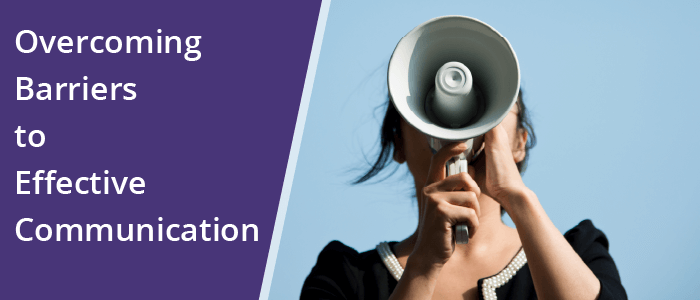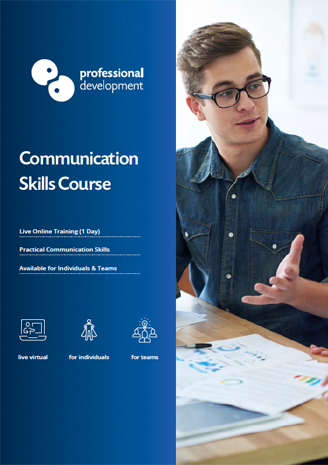Overcoming Communication Barriers: A 3-Strategy Guide
How many of your workplace challenges could be solved with better communication?
Probably more than you might realise. Good communication skills are incredibly powerful.
Although we all enter the workplace with basic communication skills in our possession, we often neglect to evaluate and develop these skills.
This can lead to communication barriers cropping up and causing low and high level chaos.
In this article, we discuss frequent barriers to communication and provide you with 3 effective strategies for overcoming barriers.
Solid Communication
The first step in overcoming communication barriers is to strengthen your own communication skills.
Our 1-day Communication Skills Course covers key skills you need, including listening skills, assertiveness, dealing with difficult conversations, and influencing skills.
Jump to Any Section:
What are Barriers to Communication?
Anything that hinders clear and efficient channels of communication can be considered a barrier.
There are so many different types of barrier. They can change based on any given situation or working environment. We've noted the 4 most common issues below.
4 Barriers to Communication and How to Spot Them
1. Language
You’ll find that language may be a barrier if you use a lot of complicated technical terms, buzzwords, or colloquial terms.
It's also something to consider if you're not communicating in your first language, or to others who are not fluent in your language.
2. Emotion
If you’re too worked up about what you’re trying to communicate, it can be difficult to get your message across.
Likewise, fear or uncertainty on your part can instil doubt in those you are communicating to.
3. Interpersonal
Being unable to establish a connection or rapport with others can inhibit your ability to communicate well.
This may refer to a rapport between colleagues, staff and leadership, or with clients.
4. Cultural
In addition to national or ethnic culture, this can also relate to different workplace cultures.
Diverse cultural perspectives and backgrounds could lead to misinterpretation in communication.
How Can You Overcome Barriers? (3 Strategies)
Don't worry, the barriers listed above – and almost all other kinds of barriers – can be overcome.
Here are our 3 key strategies for conquering barriers to effective communication:
1. Become aware of barriers, especially the kind you face regularly.
If you’re feeling stuck in terms of communicating with others, either in general or in a specific situation, start to observe and reflect upon your interactions.
This will give you a clear idea of where your barriers lie.
2. Develop skills to strengthen your communication and overcome barriers.
Attend communication skills training to develop the skills and confidence you need to be able to navigate different situations.
Our 1-day Communication Skills Course is a perfect way to acquire the skills and knowledge you need in an efficient, budget friendly way. You’ll cover:
- Communication styles
- Key communication skills
- Assertiveness & Handling Conflict
- Influencing skills
This is a high-level, module overview. You can get a full course outline by downloading our brochure.
3. Combine your skills with our checklist
Once you have completed communication skills training and gained the skills you need, combine them with our handy Communication Barrier Checklist below.
Your Communication Barrier Solution Checklist
1. Get an Anchor: What is Your Message?
Always start here. Before you speak, take a moment to consider what it is that you really want to communicate.
Let this be your anchor as you communicate.
2. Know Your Audience
This is a perfect place to consider cultural and situational differences. Who are you speaking to? What is their experience of the subject you’re talking about?
3. Keep it Simple
This circles back to having an anchor. Avoid an information dump where your intended message gets confused by or lost in a lot of noise.
4. Choose Your Method Wisely
Many sensitive subjects are more easily addressed with face-to-face conversations. Some issues can be resolved faster via email.
Consider the situation before you choose your mode of communication.
5. Select Respectful Wording
Once you choose a format for communicating, ensure that how you speak or write is both appropriate and respectful.
6. Select Clear Wording
Once again, circle back to your anchor. Are you explaining this in the most easy-to-absorb wording?
7. Edit, Edit, Edit…
This applies to written and verbal communication, although admittedly it’s easier to do with written communication.
Think about what you say before you say it and ask yourself if there’s a better way to explain things or respond to a comment.
8. Pause for Feedback
Don’t assume anything. Just because something is clear to you, it does not mean it will be for everyone. Leave an opportunity for questions.
9. Actually Listen to the Feedback!
Yes, active listening comes up time and time again as a key communication skill.
So often we almost switch off when others speak. Stay engaged, listen attentively and ask questions. Repeat what others say to determine you have understood correctly.
You'll learn techniques for active listening during our Communication Skills Course.
10. Switch on your Receptiveness
You may find that a better solution or insight comes from the feedback you hear.
Leave room to stray from your own agenda and be receptive to new ideas and perspectives.
11. Diffuse Your Emotional Charge
If things get heated, or you meet with criticism or objections, try to resist a knee-jerk emotional reaction.
You’ll achieve more by remaining calm, listening attentively to the objections, and working to resolve these obstacles.
12. Be Confident
Understand what you are talking about and then trust your own ability to stand behind what you say.
13. Take time to learn from Barriers
Even communication experts come up against barriers from time to time.
When this happens, consider the barrier as an opportunity to get even better. Think about how and why it cropped up, and how you can avoid this in the future.
Start Overcoming Barriers Now
Are you ready to improve your communication skills so that you can tackle barriers as they arise, and in time, avoid them altogether?
Here are 3 different training options we offer for developing strong communication skills so that you can handle barriers with ease:
Option 1: Focused Communication Skills
Communication Skills Workshop – 1 Day - €175
A brilliant all-rounder for anyone who wants to gain stronger communication skills.
This 1-day Communication Skills Course equips you with a very solid set of skills you can utilise to successfully navigate any barriers that crop up.
Option 2: Communication & Management Skills Combined
QQI People Management Course – 3 Days - €575
This QQI People Management course is available for anyone to attend. We offer live virtual training dates in online all year-round.
This is an intensive management course, with 1 module dedicated exclusively to building excellent communication skills.
Option 3: In-Company Training for Teams
Customised Communications Course – 1 or 2 Days - Online or In-Person
We also offer this communication skills training as a tailored, in-company programme.
Designed to be customised for each team we deliver to, our Communication Skills workshop is the perfect way to develop your team's ability to communicate more effectively.










